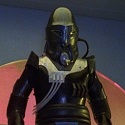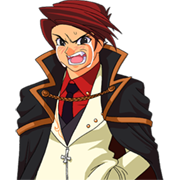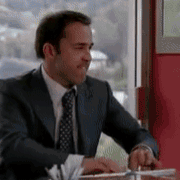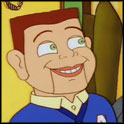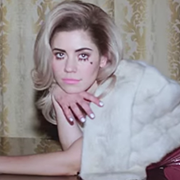|
Vertigo Ambrosia posted:The point isn't that Reagan deserves to be taken seriously as an artist and not just as a blockbuster superhero actor, but that the concept of high art vs. low art (dramatic theater vs. titillating film) is complete loving bullshit. The critic character is really obnoxiouisly on the nose about the debate (she's a real weak point of the film, particularly the scene where Reagan confronts her), but remember what she ends up writing; after deriding the entire genre of action films, she ends up praising a dude actually shooting himself in a scene where he commits suicide. She, and the theater community in general, enjoys cheap violence and gore just as much as the people who saw all the Birdman films to see him fly around and beat up monsters. We're all watching an independent film by a famous director where Michael Keaton flies around in the air and walks around in his underwear, and that doesn't make us philistines. I came away with the reading that it's not about the quality of art, it's about honesty. In order for his play to work, he has to spill real blood. Like the Rolling Stones song, "If I could stick my pen in my heart, spill it all over the stage." It's a film about pouring yourself into your work and giving the truth to the audience, and how loving hard it is and how vulnerable you are doing it. The audience isn't cheering when Riggan shoots himself because they want blood and gore and spectacle, it's because they just witnessed an artist literally spilling his blood, sweat and tears in front of them. It's not cheap at all. The superhero movies he had been doing were inauthentic. They were for pay, soulless works. And so the play is a challenge for Riggan to create something that truly expresses the weight he feels everyday of his life. And the tension is about whether he's actually capable of that or not. Note how his line readings at the beginning of the film are forced, weak acting. By the end we believe every word he's saying. It's an amazing transformation.
|
|
|
|

|
| # ? Apr 19, 2024 11:18 |
|
The comparison to Mullholand Dr. is an apt one. I took from this film a very similar message. Both are highly metatextual works that use constructions of cinema to try and communicate a message about the struggle to access the real (and to find and develop the "real self")- and ultimately fail to do so, because it's impossible. One uses television soaps and melodrama as an anchoring point of juxtaposition, the other uses The Avengers. Riggen can only gain recognition from other people by letting his person be destroyed. By the end of the film, I was really wondering where it could possibly go, but I also knew the answer: there could be no ending, only a perpetuation of what has gone before; Riggen has reached the end of history. He commits to the fantasy image, which is the only image, and throws himself out the window. Sam discovers her father, and it's ambiguous if she's elated to discover his corpse, or looking upwards because she has not found his body and instead seen flying through the sky. Both are true.
|
|
|
|
Anonymous Robot posted:Riggen can only gain recognition from other people by letting his person be destroyed. By the end of the film, I was really wondering where it could possibly go, but I also knew the answer: there could be no ending, only a perpetuation of what has gone before; Riggen has reached the end of history. He commits to the fantasy image, which is the only image, and throws himself out the window. Sam discovers her father, and it's ambiguous if she's elated to discover his corpse, or looking upwards because she has not found his body and instead seen flying through the sky. Both are true. Uh I think it would destroy the central relationship of the film if she was "elated to discover his corpse", her reaction is pretty obvious that she sees him flying.
|
|
|
|
Why? Every other scene of magical realism in the film is both instances at the same time. Riggen is flying and taking a cab. He's using telekinesis and throwing poo poo around. It's implied that both are true.
|
|
|
|
Anonymous Robot posted:Why? Every other scene of magical realism in the film is both instances at the same time. Riggen is flying and taking a cab. He's using telekinesis and throwing poo poo around. It's implied that both are true. Why would his daughter be happy that her father committed suicide moments after they had a breakthrough in their relationship? It's implied that the fantasy moments are all in his head (he thinks he's flying but he's actually taking a cab; he think he's telekinetic but when he gets witnessed doing it by another person he's just trashing his room) and nobody reacts to any of his "powers" up until the end which is deliberately more ambiguous.
|
|
|
|
Why do we assume Emma Stone's reaction is happy in the final shot? Working at a theatre, I've been able to catch the final scene a few times. And each time her facial expression becomes even more and more ambiguous. Perhaps she is elated to see him flying, or maybe she's in a shock, unsure of how to react to the image of her fathers splattered corpse. Her smile could be either awe-inspired, or delirium. It's a fantastic bit of acting, and not having an image to put the shot with keeps it forever ambiguous.
|
|
|
|
Actually, I was about to say that 'elation' is probably the wrong word for it. The fact of the matter is, death is an impermanent and always-present state in Birdman. As his lawyer says, you can always get a new nose. The play is being being optioned for performance in replication across the country, by the end of the film. Every night, an actor will stand up and shoot his nose off. To read the "suicide" as a final punctuation on the film means ignoring the rest of its structure, the way that it works in imprisoning repetitions and cycles. He's flying just as much as he's been slain. Both don't really mean anything. As the apocalyptic street preacher/hopeful actor (!) says, it's a story told by an idiot, signifying nothing. That's a hard pill to swallow, but I don't see how one could read it differently.
|
|
|
|
After he jumps out the window and Emma Stone's character is going to look out you can hear sirens in the background, indicating to me that he jumped to his death. I thought that her looking up and smiling was just showing us that she had the same illness her father had. I mean, Riggan is crazy there's really no question about that.
|
|
|
|
But, the rest of the film is deeply symbolic/metaphorical, to the degree that you can't really be sure that what you're seeing onscreen is really happening, or just symbolic of what's happening. I think it's kind of a mistake to merely subscribe all that to Riggan being crazy, to think he jumped to his death at the end. To my mind, the scene at the end means freedom, rather than death; Riggan had a problem at the beginning and he found a way to solve it, and this liberates him so much that he feels like he can fly. That's all the ending says to me; no need to bring suicide into it.
|
|
|
|
resurgam40 posted:But, the rest of the film is deeply symbolic/metaphorical, to the degree that you can't really be sure that what you're seeing onscreen is really happening, or just symbolic of what's happening. I think it's kind of a mistake to merely subscribe all that to Riggan being crazy, to think he jumped to his death at the end. To my mind, the scene at the end means freedom, rather than death; Riggan had a problem at the beginning and he found a way to solve it, and this liberates him so much that he feels like he can fly. That's all the ending says to me; no need to bring suicide into it. Exactly. It doesn't matter whether he flies or dies. That's why we're not told. It doesn't matter if the hallucinations are "real" because it's all theatre and cinema. Everything we've witnessed is fake. It's about the soul of the character, not about solving a nonexistant puzzle. It's the same thing with the spinning top in Inception: Everyone's so preoccupied trying to figure out whether it's a dream or not using context clues that they overlook that the point of the scene is that Cobb doesn't care.
|
|
|
|
Passed by the Angelika in nyc tonight and decided I should stop in to give this a shot. I'm so happy that I did because I was greatly rewarded. What a fantastic film. I knew absolutely next to nothing about it and my experience was that much better for it. Keaton and Norton are phenomenal. The score had me uncontrollably tapping my feet along in the theater and I noticed there was a big dumb grin on my face throughout most of it all. Moving away from the ambiguity of the ending, I'm a little more fixated on that scene from the very beginning that was repeated toward the end, right after Riggan shoots himself in the nose. The one with the fire in the sky and those... things floating in the muck. What was up with that stuff?
|
|
|
|
ShoogaSlim posted:
Those otherworldly images had a pleasantly calming affect, and they reminded of Emma Stone's character's toilet paper-role which reduced all of humanity, along with a single ego... to a single slip of tissue. They were scenes from before humanity and put all these worries about the play, and the plot, into perspective. Those scenes are also the only "cut-scenes" in the film, they exist outside of the illusion of the lengthy two-hour take. I don't read the ending as ambiguous. I think a lot of this film has to do with voyeurism and often turns the camera onto the audience. One of the most amazing scenes is when he shoots himself and the entire audience in the film is staring directly at you and clapping. Whether your wincing crying, yawning or rolling your eyes you have this standing audience staring at you, clapping. The whole film you feel like an invisible floating eye prying into the emotional lives of these characters, awkward as they may be. Social media is certainty one of the major themes. Riggan is neurotic and tormented but also completely addicted to this exposure. I feel that in the final scene, after getting his image Tweeted, he just kind of leaves the voyeuristic reality of the movie out a window. His daughters smile is private, and not our's to know. Does that make sense? Also the best joke in the film is a crude phallic joke about comparing guns: Norton's character initially one-ups Riggan with displaying a boner on stage during the gun scene, berates him for his fake gun, and is one-upped in turn when Riggan brings an actual gun to the stage.
|
|
|
|
ShoogaSlim posted:Passed by the Angelika in nyc tonight and decided I should stop in to give this a shot. I'm so happy that I did because I was greatly rewarded. What a fantastic film. I knew absolutely next to nothing about it and my experience was that much better for it.
|
|
|
|
Just got back from this. GF was bored, I found myself a bit bored as well. I love Keaton, the acting was great, but the movie just wasn't very entertaining. It felt like some kind of dogwhistle for theater geeks. Don't regret watching it, but I wouldn't see it again.
|
|
|
|
oswald ownenstein posted:Just got back from this. GF was bored, I found myself a bit bored as well. I love Keaton, the acting was great, but the movie just wasn't very entertaining. It felt like some kind of dogwhistle for theater geeks. You were bored during Keaton smashing his dressing room with telekinesis? Arguing with his Birdman alter-ego? Wrestling around with a half naked Ed Norton and then fake-sobbing over his sexually abusive father? What kind of movies do you find entertaining?
|
|
|
|
GonSmithe posted:The fire was Icarus falling from getting too close to the sun, then "things" were the jellyfish that stopped him from drowning. I took the fire to be phoenix imagery. He's a bird(man) who dies and is reborn. That's why I can't buy that he's dead at the end. Emma Stone's reaction is signifying that she's reconnected with her father. They understand each other now.
|
|
|
|
Chronicles posted:I took the fire to be phoenix imagery. He's a bird(man) who dies and is reborn. That's why I can't buy that he's dead at the end. Emma Stone's reaction is signifying that she's reconnected with her father. They understand each other now. That's definitely what her reaction means. But it doesn't mean he's alive or dead. Riggan will always exist in a Schrodinger's Cat type state of both living and dead, because that's where the movie ends. Unless there's a sequel.
|
|
|
|
The ending reminds me of the ending scene to Being There in which Peter Sellers character walks on water, dipping his umbrella in the water to show how deep it is. At one of Roger Ebert's film examination classes, someone tried to explain it away that his character was walking over the sandbar of a submerged pier. Ebert shouted him down that there is nothing in or around that area to suggest a sandbar or a pier ever existed. What's up on the screen is what the director wanted to be there and cannot simply be explained away with your own rationale for what's visibly present or acceptable to your own view. When Birdman finished, I walked out of the theater with older audience members doing just that. "I think his gown got caught on a crane and hauled him up like that superhero." "He probably died and Stone saw the fire in the sky they keep showing." Sometimes I really hate going to the bigger theaters.
|
|
|
|
What you think happened after a movie can be a good starting point for thinking about the movie on a tonal/thematic level, actually, especially when parsing something that's this metaphor-laden. I don't think he literally died. I think the scene is a visual metaphor for the old Riggan, the one tied down by the Birdman character, fading into memory and a new Riggan, who can actually be recognized on his own merits rather than just for his iconic character, rising from the ashes. But if you want to say he died? gently caress it, I can buy that too. I just don't like it as much.
|
|
|
|
|
Honestly, it felt like a hamfisted "did he or didn't he?!?1" ending shoved into a movie that was a little too full of itself. It wasn't written or conceived as "and then he flew because he really did have telekinetic powers" or "he died and his daughter saw a rainbow" - it was written/conceived as "and then I'll put this metaphor in which will make people guess because I'm a hipster and it's edgy *nudges glasses*" I hope it gets enough love that we get more Keaton in things though. oswald ownenstein fucked around with this message at 22:08 on Nov 17, 2014 |
|
|
|
What's dumber, hipsters or Big Theater people talking about a movie afterward?
|
|
|
|
It might have just been me, but I felt like that Riggan's arc is one of Buddhist enlightenment and the ending is his literal ascension into the Bosom of the cosmic universe.
|
|
|
KingsPawn posted:It might have just been me, but I felt like that Riggan's arc is one of Buddhist enlightenment and the ending is his literal ascension into the Bosom of the cosmic universe. This is actually probably a better interpretation than mine.
|
|
|
|
|
I have to say, I hated this movie. Allow me a qualifier that I thought The Wrestler was one of the best movies I've ever seen and while I haven't had the chance to see JCVD, the concept of washed-up actors once beloved by society dealing with the harsh realities of becoming forgotten is an amazing one and I have no problem with that. I also loved Black Swan (which I found eerily similar for a comparison I have seen exactly zero people make. BLACK SWAN/BIRDMAN SPOILERS Theatrical show, stresses on the star possibly contributing to vivid hallucinations throughout the movie, an ending left ambiguous as to whether the main character committed suicide) and I really liked the cinematography and the "continuous cut" illusion before anybody tells me how much the movie went over my head. I absolutely loved Ed Norton's performance and Emma Stone was surprisingly good. I don't think I've ever gotten a chance to see her with a script that really demanded a lot from her and I felt she did okay. The one big emotional scene she had I felt she kind of flubbed a bit but that's all opinion on my part. Overall she was a lot of fun to watch. Back to Norton, he stole the show in every scene he had and then his character fell down a well during the third act and he suddenly never showed up again. I really don't understand this. He was a major part for the first couple acts and then by the end there's no resolution for his character, no explanation for his motives throughout the movie, they put a sharp stop to his chemistry with Emma Stone and just ended his story. He's in the background of a couple shots and that's it. The stupid hallucination poo poo. We've got to talk about it. What was the point? To draw another parallel to Black Swan, a much better movie in my opinion, the hallucinations serve to put the viewer in the mind of the protagonist. She's stressed and confused and the movie puts us there with her by leaving reality ambiguous. For a long time you're not sure what's really happening and what she's imagining and neither does she. This makes the climax all the more dramatic when her visions start to unravel and the final scene is stronger for it. In this movie, there's no consequence to whether or not he's really telekinetic. And what the gently caress was with that, anyway? Was the Birdman character telekinetic and he's losing sight of where he ends and his superhero character begins? Because otherwise it's just, oh, hey, he hallucinates that he's telekinetic. The movie goes out of it's way to portray his hallucinations as false. There's no ambiguity, as one poster said. There's clearly a cabbie chasing him for cab fare. There's clearly no debris from the explosions and fight scenes he envisions. So he's obviously imagining things. That's okay, but maybe do something with it? Every time he started having a vivid hallucination, it felt like a cheap ploy to add action and mystery to this movie that really didn't need it. I can watch a long movie about a play with people talking, that's interesting. Throwing in a scene where a giant robot bird fights with helicopters and saying, "whoa, our main character sure is crazy, right?" with zero consequence is mindless and dull. They could have easily portrayed Keaton's character as losing his grip on reality without it being such a visual spectacle as well. A good couple minutes of screentime are dedicated to this magic dream sequence, and then the movie just goes on like it never happened. Even The Big Lebowski used it's dream sequences better than this. At least those offered some insight into The Dude's mindset at the time or thoughts on characters. You could cut every hallucination out of this movie and the script would be no worse for it. I agree with an above poster who said the open-ended ending also felt like a cheap "oh man, who knows what happened?" moment to get people talking when a smile on Keaton's face and a quick cut to black would have served the film infinitely better in my opinion. I really really wanted to like this movie. Now please tell me about how I'm too stupid to have understood it because that it honestly a favorable reality to this one where critics whose opinion I respect are jerking this movie off with both hands and I'm left wondering if I accidentally took crazy pills this morning.
|
|
|
|
I would have been ok ending the film with the gunshot and audience applause but then it really would have been Black Swan. The shot of sad Birdman on the toilet at the end was funny enough that I wouldn't really change anything though. I really just liked it overall as a blurring of lines between theater/film. The continuous take interrupted by the three time-lapse act breaks/set changes was just super charming. A True Jar Jar Fan fucked around with this message at 03:21 on Nov 18, 2014 |
|
|
|
While I'm also a bit mixed on the film, the Birdman action sequence was an important part of the film's themes. Remember that Riggan is basically Keaton himself - a washed-up actor trying to regain relevance 25 years after walking away from a silly superhero franchise that he's now most known for instead of being a real artist. Throughout the film, Keaton's basically pissed off that he got into the superhero game too early, and only now are superhero movies taking off and making a shitload of dollars - there are scenes early in the film where he resentfully overhears news stories about how much money Marvel/RDJ/etc are making, and how famous they are. As much as he wants to buckle down and reestablish himself as a 'real artist' with this Broadway play, the Birdman in him is egging him on to get back in the superhero game. The Avengers/Transformers-style fantasy action sequence is there to implicate Keaton/movie audiences by saying that 'none of this talky, sensitive poo poo is what you really want, you want explosions and action and adrenaline!' (which is basically what Birdman tells us in that one monologue where he's speaking right to the camera). For better or worse, the film explores that high art vs. low art divide/conversation (theatre vs. film, superhero movies vs. independent dramas, actors vs. movie stars), and the action sequence is an important part of that. So no, it's not meaningless. I still wasn't too hot on it for being a bit snide and reductive about high art/low art stuff, but you can also look at it as Riggan being ashamed of his low-art background and notoriety as opposed to actually making GBS threads on it. Hewlett fucked around with this message at 04:39 on Nov 18, 2014 |
|
|
|
Yeah, there's a lot in here about Keaton himself but I was also pretty surprised to see Norton playing the awful, controlling perfectionist that I've heard stories about from real life sets. I guess he has to have a pretty good sense of humor about himself to take a role like this! Both dudes have pretty solid stories here, but I did feel like I was missing something when Norton receded so much in the final acts.
|
|
|
|
Advice posted:
I think you put into words my feelings better than I could have, except I didn't really hate the movie I just didn't find it to be very good. Kind of like how Prometheus had great cinematography but was a total piece of poo poo, this movie had a lot of great performances but was overall not very enjoyable. I'm also a little surprised that critics loved it so much when the movie calls out critics pretty boldly. Maybe they just justify it by thinking "
|
|
|
|
oswald ownenstein posted:I think you put into words my feelings better than I could have, except I didn't really hate the movie I just didn't find it to be very good. Actually, some critics did call this out. Richard Roeper remarked that the critic character was far too vile and that she'd be fired on the spot for saying something like that. I didn't mind that aspect because the whole the theme throughout seems to be that Riggan is surrounded by hatable and egotistical people that there is no way out. There is no one to confide in be it his family, his actors, his lawyer or the critic who he thought would judge him by his work and not on personal perception. He's doomed on all fronts.
|
|
|
|
The critic scene was possibly the worst in my opinion but for a reason I don't see people bringing up. It took me completely out of the movie how unrealistic it was. For a scene that wasn't being exaggerated by crazy special effects or any hallucinations it was one of the least grounded in reality. First, the bartender gives Riggan his drink, then he gives him a martini and tells him it's for the critic (? why did he tell him or give it to him? If the critic ordered it, it's got nothing to do with Riggan, and he wasn't buying her the round, because he didn't even realize she was there nor offer to pay for it until the bartender tells him about it! The scene starts off making no sense), he brings it over to her initially attempting to extend an olive branch, but she makes it clear she has no intention of being civil with him. Then Riggan, clearly already pretty drunk, begins to berate her and finally loses his temper. He gets very aggressive with her, to which her reaction is to continue sipping her drink and calmly writing as though she read the movie script in advance and knows he won't injure her. Then he GRABS HIS GLASS AND THROWS IT AGAINST A WALL and she doesn't even loving flinch. This already aggressive drunk standing two feet from you gets violent and starts throwing glasses into walls right next to your face, and she keeps writing. She keeps sipping her drink. She delivers a couple of quips, continuing to antagonize him, and he regains his composure and walks out. She acts in a manner literally no person would when confronted like that. Entire scene took me out of the movie more than the goddamn CGI robot bird did.
|
|
|
|
The bartender is passing the drink to a waiter when Riggan volunteers to bring it to her. The waiter is mostly off screen but the bartender isn't even facing Riggan when he says his line. The critic being unflinching said to me that this isn't the first time she's been through this routine. The fact that she writes a positive review anyway shows that her persona is as much of a facade as anyone else in the film. A huge part of the movie is appearances and the way we present ourselves to the public, dropping her stoic character would be bad for her reputation. A True Jar Jar Fan fucked around with this message at 19:35 on Nov 18, 2014 |
|
|
|
Surlaw posted:The bartender is passing the drink to a waiter when Riggan volunteers to bring it to her. The waiter is mostly off screen but the bartender isn't even facing Riggan when he says his line. The critic's speech to Riggan can probably be seen as her challenging him. She puts him down before even seeing the play to see if he goes and improves his performance.
|
|
|
|
Advice posted:Entire scene took me out of the movie more than the goddamn CGI robot bird did. You mean the pointless CGI robot bird that was literally meant to be a pointless CGI robot bird commenting how artificial and loud his easy career path once was?
|
|
|
|
Are there any technical articles about how the film was shot and edited? There were a few scenes I was curious about, especially the way that the camera seems to disappear in a lot of critical scenes, and the places where they put in cuts despite maintaining the illusion of a continuous take.
|
|
|
|
FrostedButts posted:You mean the pointless CGI robot bird that was literally meant to be a pointless CGI robot bird commenting how artificial and loud his easy career path once was? Read my post again. I wasn't calling attention to the bird scene in a negative way or implying I didn't understand why it was in the film, I was simply using it as an example to show how much the critic's response (or lack thereof) to the violence took me out of the movie. The bird scene took me out less. Even though it was a wild action scene. See, this is what I hate most about movies like this. They're almost immune to criticism because every psuedo-intellectual takes a break from jerking each other off about how deep the movie is to inform me how I must not have "got" it. This post came off more aggressive than I wanted it to and I apologize. I have no intention of fighting over this movie. I just wanted to point out that I didn't misunderstand that scene. I brought it up for another reason.
|
|
|
|
Advice posted:See, this is what I hate most about movies like this. They're almost immune to criticism because every psuedo-intellectual takes a break from jerking each other off about how deep the movie is to inform me how I must not have "got" it.
|
|
|
|
Surlaw posted:Criticism is fine and good but this is really stupid, sorry. No it's a pretty apt description of the people gushing over this movie
|
|
|
|
He asked some questions, got a couple of answers, ignored them and then lashed out at a bogeyman. Edit: So I'm not just posting about posting: I don't think the critic scene is particularly good but I liked it as a mirror to the scene where Riggan's daughter blows up at him. They're both scenes where a Thomson just unleashes a tirade of "truth" on their target while the other party sits almost silently and just take the beating. The big difference is his daughter can show regret while Riggan's just kind of a poo poo. She gets a lot right that her dad gets wrong. A True Jar Jar Fan fucked around with this message at 21:36 on Nov 19, 2014 |
|
|
|
I thought this was some cheap, terribly marketed superhero movie when I caught a matinee of this. I was extremely, but pleasantly surprised at what it turned out to be. Incredible acting all around. Norton and Keaton in particular were absolutely amazing. I'm incredibly glad that a movie like this can actually get a wide release every once in a while. It really was a breath of fresh air.
|
|
|
|

|
| # ? Apr 19, 2024 11:18 |
|
Advice posted:
But, like, isn't your own criticism on the critic within the film, also a "performance?" Dude, you are like, totally playing into Iñárritu's game. Cray Deep.
|
|
|


